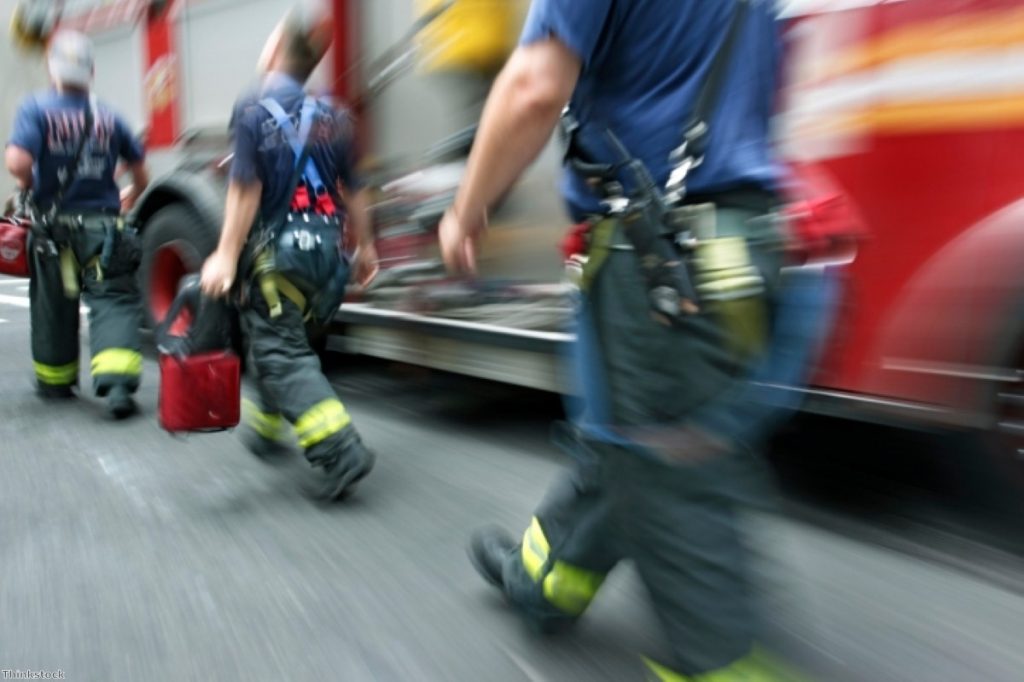Analysis: The forgotten public service
Fire and rescue services are never more vital than when dealing with a national-level incident – exactly when the coalition’s policies are hurting them most.
That’s the opinion of Roy Wilsher, at least. He’s the man who headed the team Britain sent to Japan in the aftermath of that country’s devastating earthquake. He led the emergency response to the Buncefield industrial fire, Europe’s worst peacetime blaze. He’s the chief fire officer at Hertfordshire Fire and Rescue Service. He’s the operations officer at the Chief Fire Officers’ Association. And he’s the government’s strategy adviser when it comes to national, ‘catastrophic’ events. The kind when the country’s fire and rescue services urgently need to share their resources.
This can be problematic. Working together doesn’t work out if firemen aren’t using the same radios, or the same breathing apparatus, or any number of apparently insignificant differences.


So there ought to be some kind of national-level coordinating going on, Wilsher argues. He wants to see a UK-wide equivalent of the local resiliency forums, when all those who will be needed on the day get together and talk through how they’ll work together.
Unfortunately, ministers don’t appear interested. They’re focused on encouraging localism – which, Wilsher says, “flies in the face” of what’s needed when it comes to national-scale disasters.
His arguments are supported by Jennifer Cole, the head of emergency management at the Royal United Services Institute thinktank. Localism works for schools, or health, or transport, perhaps. But the emergency services? They “just lost out in that”.
“With no ability to coordinate nationally any more, good practice is being stripped away,” she says.
“You can’t operate a flood response on a local level because the flood isn’t going to stay within your regional boundaries. You just can’t operate on that local level only.”
In her view the kind of national forum Wilsher’s talking about needs ministerial buy-in, but it would have to be guided by the practitioners. They’re the ones who have the knowledge and the understanding to do the job properly, after all.
“The UK is pretty resilient,” Cole says. “What happens when a situation occurs is that the emergency services do their job very very well, and absolutely to the best of their ability.
“The problems come not in how well they do the job, but how much it costs and how much pointless bureaucracy it costs to get there. There is a lot of money being wasted in the emergency services because it’s difficult for them to link up.”
For now, the coalition government isn’t willing to budge.
This is especially frustrating to some because the Conservatives had appeared enthusiastic about improving national planning before the general election. Last October’s national security strategy acknowledged – and emphasised – the need to “provide resilience for the UK by being prepared for all kinds of emergencies, able to recover from shocks and to maintain essential services”. Somewhere along the way, the great tide of driving responsibility downwards from Whitehall has swept away fire and rescue with it.
The Department for Communities and Local Government said it would work with fire and rescue services to define national and local resilience roles and reflect them in a new national framework.
“We are encouraging more joint working between the emergency services,” a spokesman said. “This is better than imposing artificial and arbitrary regional structures which didn’t work.”
He’s is referring to a venture into a doomed attempt to introduce regional-level control. New Labour started its ill-fated attempt to set up nine Regional Fire Control Boards in 2003. None of them ever managed to get up and running, Labour MP Clive Betts says.
His communities and local government committee, which will publish a broader assessment of the coalition’s localism agenda later this week, is unconvinced by the virtues of persevering with a regional framework.
“You can still have operating agreements and operating working practices to deal with national emergencies. It seems absolutely right,” he says.
“But you need to make sure people on the ground are part of that planning process.”
Ministerial reluctance to act may have something to do with the complexity of the problem before them. That’s reflected in the difficulty experienced when trying to define what the fire and rescue sector actually is. Is it the trade unions, the fire authorities, fire services, local government group or the Institute of Fire Engineers who speaks for them?
Reforming this mess could take 15 to 20 years, Cole estimates. Forming a national-level body led by ministers would probably lead to costly decisions, too. Upfront investment might be identified as essential for long-term savings, or even broader emergency services reform. “Politicians don’t tend to think long-term,” she says. “Why should they care?”
The urgent need for interoperability, highlighted by Wilsher, is one very pressing reason. On 9/11, the New York police knew that the second World Trade Centre tower was going to collapse – but they couldn’t speak to the firefighters in the building over their radios. As Cole says: “This isn’t just a nice thing to have. This costs lives.”

